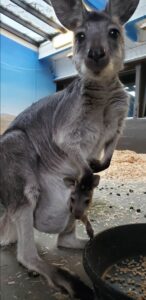
The Woodland Park Zoo animals continue to survive and thrive this spring, thanks to the tireless work of the Zoo keepers and veterinarians. Not only are the animals that live there doing well, but so are all the new animal babies that have recently joined the community!
The wallaroo and wallaby joeys, born last fall, are emerging from their mother’s pouches, and growing ready to face their public. Joey’s start as tiny, pink and hairless when newborn – about the size of a lima bean – and without sight, and yet they manage to crawl their way into their mother’s pouch. The infants grow, safe and warm, and drawing nutrients from mom. At 5 or 6 months, the joey starts to peek out of mom’s pouch.
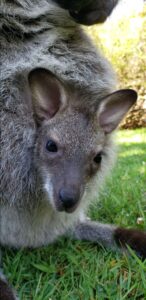
This is true of wallabies, wallaroos, and kangaroos. The three animals are very similar, except in size. Wallabies are much smaller than the other two, standing between 12 and 20 inches tall and weighing up to 15 pounds. Wallaroos can stand up to 5 feet tall, and weight up to 120 pounds.
At about 7 months, all these joeys begin to leave their mother’s pouch, for moments at a time, to get a taste of the outside world. Finally, at about 8 months, the joey will leave the pouch for the last time to become fully independent. Animal keeper Amanda Dukart said of Tinga, the Wallaby, “Her joey seems very curious, while being a healthy amount of cautious. The joey has come out of the pouch multiple times for short bursts to get the zoomies out, but likes to spend the majority of its time in the pouch.”
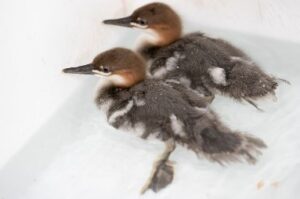
As for Poppy, the wallaroo mom, Dukart has said, “Poppy’s joey is curious and braver than a lot of the previous joeys I have worked with,” much like Poppy herself, “It uses his nose to investigate all the good things on the ground – things Poppy is eating,” Poppy is a first time mom, while this is Tinga’s third.
The Zoo also now has a pair of very rare birds being hand-reared by animal care staff. The scaly-sided mergansers, also known as Chinese mergansers, were hatched for the first time at Woodland Park. “These birds are sensitive and endangered, so we’re taking every precaution necessary to give these ducklings the best start we can,” said animal keeper Joanna Klass, “By hand-rearing the chicks, we can ensure they are getting all the food they need.” The ducklings were hatched under the Scaly-sided Merganzer Species Survival Plan, to protect a species of only about 5,000 in the world. When they mature, these ducklings will be paired up and sent to another Zoo for care and breeding.
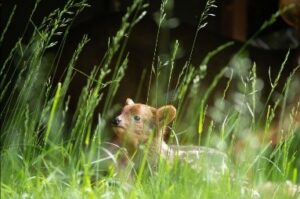
Last week, two more new babies were delivered at the Zoo – a male pudu fawn and a female mountain goat.
Pudus are the smallest deer species in the world. Native to South America, this fawn was born to first-time parents Maggie and Ted, on May 14th. The last pudu birth at the Zoo was 10 years ago. “The new mom is providing good maternal care to her fawn. We’re pleased he’s nursing and mom and fawn are bonding,” said Mark Myers, an animal curator. Ted and Maggie were paired under a breeding program, to help ensure a healthy, self-sustaining population of the species.
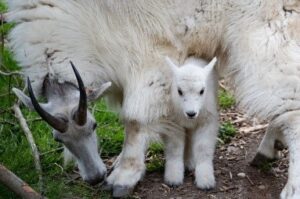
Our newest mountain goat, born May 15th, is also the first kid of mom Atlin and dad Zeus. Zeus was born in the wild, and came to the Zoo as an abandoned or orphaned kid. This makes him a founder animal. “The birth of Zeus’s first kid is wonderful news. As a founder animal, his genes are very valuable and will infuse genetic diversity into the North American zoo population,” explained Kevin Murphy, another animal curator at Woodland Park. The last mountain goat kid born at Woodland Park Zoo was in 2018.
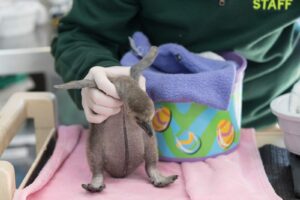
To find out about breeding plans and efforts by the Woodland Park Zoo, and its partners to conserve species, visit the Zoo.org website and see the Conservation page (click here.) Also, consider giving money to support the important work of the Zoo and the care of these newborns. Woodland Park is temporarily closed, due to concern over COVID-19 transmission, but the exceptional animal care and veterinary teams are still on-going. Please give to Zoo.org/relief to fund this vital work.

